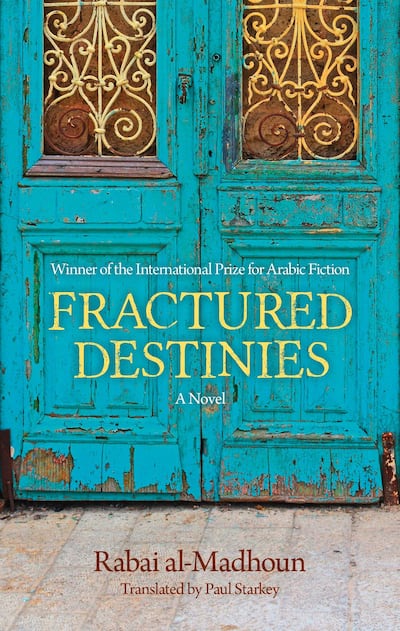Written as a response to the experience of Palestinians living in Israel, Fractured Destinies deservedly won Rabai Al Madhoun the International Prize for Arabic Fiction in 2016. Now translated into English by Paul Starkey, Al Madhoun explains why living in London helped him deal with issues such as exile and identity – which are so important to the book.
It must feel like a long time ago now, but can you tell us how the journey to Fractured Destinies began?
After I finished with The Lady from Tel Aviv, I started thinking of writing about the Palestinians in Israel; those who stayed in their homeland during the Nakba catastrophe of 1948 and later became Israeli citizens.
One of the inspirations was a relative of mine who refused to leave Al Majdal Asqalan (now Ashkelon), and migrate to Gaza during the heavy bombardment. He raised so many questions for me, he was brave and lucky to stay in Al Majdal Asqalan, the city everyone dreams of returning back to one day.
On the other hand, he is the one to “blame” for living with the Israeli Jews, and carrying the Israeli passport. Though he is the good Palestinian, he is a “traitor who lives with the Jews”. So that led to my character Mahmoud and later the other characters who answer the main question of the book: what does it mean to be an Israeli Arab? Also, I wanted to tackle other major issues like exile, right to return, Nakba and Holocaust.
There’s a line in the book about the person who stays in the country being a thousand times better than the person who emigrates. What are your own feelings about that, as someone who now lives in London?
I feel the same as the narrator – and might repeat that line in the book. When a Palestinian in a refugee camp who has lost his homeland, lived in poverty, is stateless, under occupation or under Israeli siege gets fed up with life, he cries and repeats those words. There were some refugees who used to blame the Palestinians who remained in their country and lived with the Israelis, but they began to envy them because at least they had stayed in their land. So in the book, Mahmoud (the person who stays) is the embodiment of those who stayed.
And how do you find living in London? Has it changed the way you approach your writing?
In London, I found myself. At last, I have settled with my family and put an “end” to my diaspora. A place where I can live and work with no fear of the future. In England, I get the first real passport for the first time in my life. London is an amazing cosmopolitan city. All that changed me and my writing. I started dealing with issues like exile, identity, homeland in a different way and I can see things from different angles and aspects.
Given that you were born and raised during the time span of some of the novel and have never lived a normal life in your homeland, would you say this is book is your most personal one?
This is a typical Palestinian life, more or less, it’s less my ego than all Palestinian egos. My third book was actually an autobiography, spanning the years between 1943 and late 1970s. So I am always there. In each of my books, there is some of me.
______________________
Read more:
The Swedish activist walking to raise awareness about Palestinian rights
Nakba Day is a reminder of the need for a peaceful solution for Palestinians
What Walaa Wants: the Palestinian girl whose dream inspired a prize-winning film
______________________
Now that the dust has settled over the International Prize for Arabic Fiction win, how do you feel about it? What effect did it have on you and your writing?
I feel excellent. It's the most prestigious Arabic literature award. It meant a lot: the money, the fame, the events I participated in. Actually it made a big change to my life for the better. But it also created a new challenge toward the next book, the same way The Lady from Tel Aviv did when it was shortlisted in 2010.
The book deliberately doesn’t give answers and remains open-ended. Can you explain why you wanted it to be that way?
That’s true. Fundamentally, I left the end open because reality has never provided answers or resolutions for the big questions.
The crisis continues, as the occupation enters its new decade (the eighth), and Palestinians are still fighting for their rights, in circumstances even more difficult and complicated.
I can’t see any hope in the nearest future, but I believe that people will change these circumstances. The Israelis face many more difficult issues and the occupation cannot live forever.
Israel is going faster toward an apartheid regime and the world will not accept that and will not stay blind forever. So I wanted to say (and the book says) for both Israelis and Palestinians: there is no way but to live in the same land with equal rights.
Fractured Destinies by Rabai Al Madhoun, translated by Paul Starkey, is published by Hoopoe


